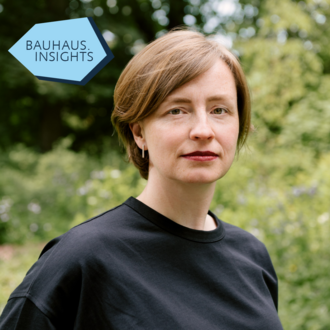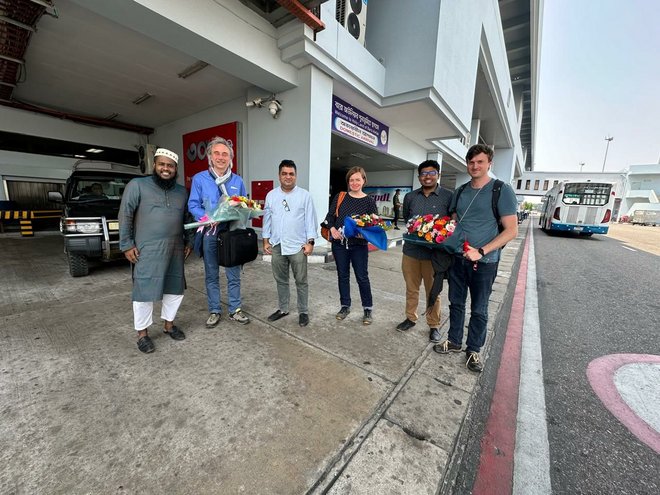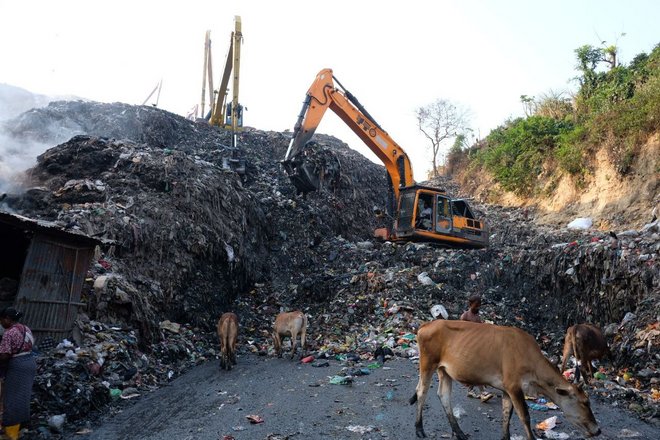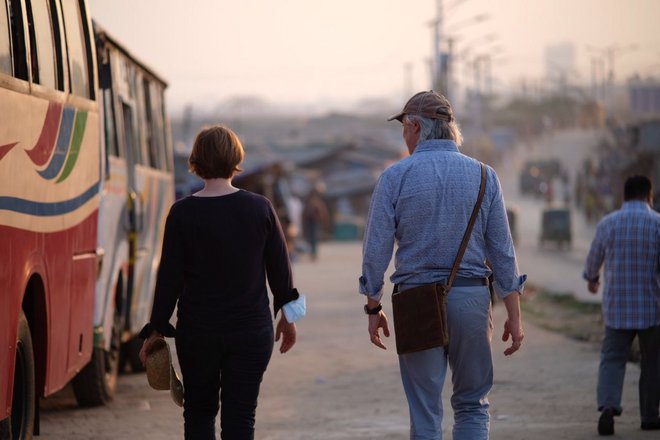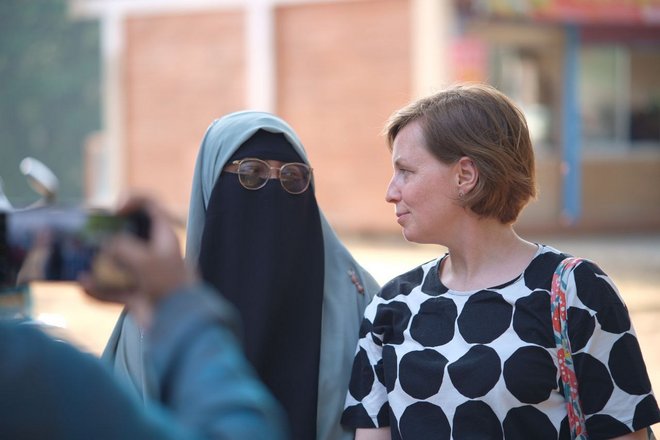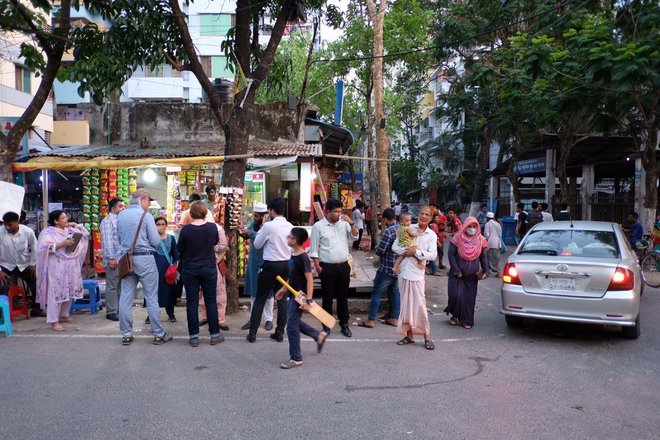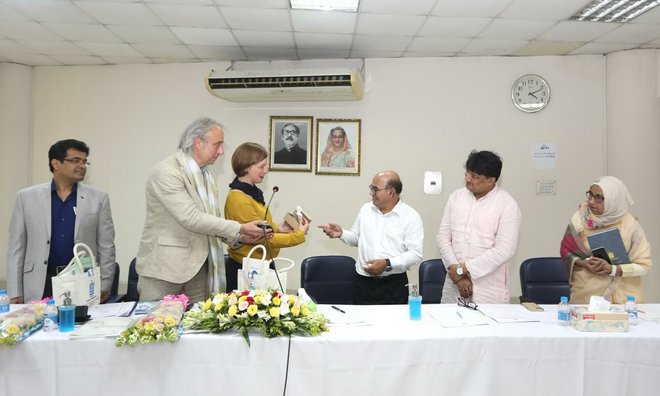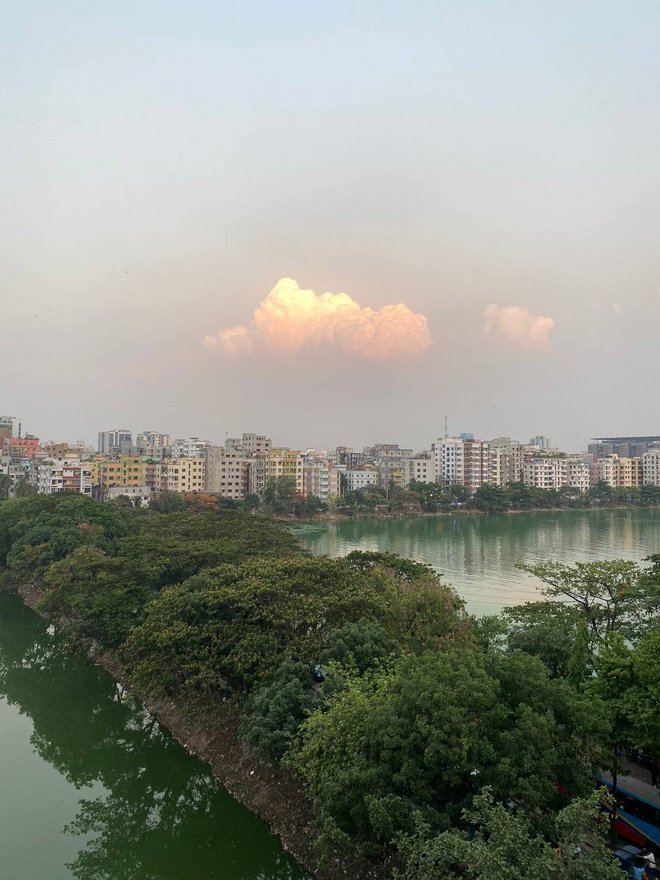BAUHAUS.INSIGHTS: How is the social transformation of Germany perceived in Bangladesh?
The city of Khulna in southern Bangladesh lies on two tributaries of the Ganges. Khulna is currently battling major waste issues, including huge amounts of plastic that get washed into the city from the rivers and further into the sea. Since 2021, scientists from the Khulna University of Engineering & Technology (KUET) have been working with colleagues from the Environmental Engineering Department at the Bauhaus-Universität Weimar under the leadership of Prof. Dr. Eckhard Kraft investigating how to avoid waste in the long term and how to implement a sustainable waste management system in Khulna.
In April, four students, Alina Belinc, Dennis Herrmann, Nicolas Schwenke and David Belitz, travelled to Bangladesh as part of a special excursion with staff from the Department of Resource Management. Also in attendance: Dr. Ulrike Kuch, Vice President for Social Transformation at the Bauhaus-Universität Weimar. The group visited a number of project locations, participated in a transfer conference and a student workshop, and visited plastic recycling shops and a landfill site.
Towards the end of the trip, Dr. Kuch was invited to give a presentation to the University Grants Commission (UGC), the most important higher education policy body in Bangladesh. The UCG is the responsible body for distributing funding to public and private universities in the state. In her lecture, Dr. Kuch presented the Bauhaus-Universität Weimar, in particular its social transformation activities, which she discussed with the 50 or so attendees.
We interviewed Dr. Ulrike Kuch for our BAUHAUS.INSIGHTS series in the online Bauhaus.Journal and spoke to her about her trip, the Bangladeshi academics’ perspectives on Germany, global challenges and potential joint solutions.
Dr. Kuch, travelling from Weimar to Bangladesh must have caused quite the perspective shift. What were your first impressions of the city of Khulna when you arrived?
It was terribly hot, 42 degrees in the shade — Bangladesh was in the middle of a heatwave. However, as guests we were nearly always in air-conditioned areas, whether in vehicles or buildings. This is a luxury most locals don’t have; it was especially painful to see people transporting mountains of bricks on their heads for hours on end. After all, the government had given us a week off of work. Khulna is also characterised by heavy motor traffic that criss-crosses the city at multiple levels. There are no traffic lights and very little signage. All of the cars and motorbikes are constantly honking, rickshaws and transport bikes ring their bells and everyone is trying to weave their way through somehow – yet everyone manages to remain calm.
The cooperation with the Khulna University of Engineering & Technology (KUET) has been in place since 2007 and numerous exchanges and projects have taken place. You were there for the first time representing the Presidium. How did this come about?
The initiative was the brainchild of Dr. Eckhard Kraft. As Climate Officer, he acts as an advisor to the Sustainability Team, which I head. The current »SCIP plastics« project (Sustainable Capacity Building to Reduce Irreversible Pollution by Plastics www.scip-plastics.com), which receives significant funding from the Federal Ministry for the Environment, Nature Conservation, Nuclear Safety and Consumer Protection, is making fundamental progress in environmental and climate protection, as you describe. The project also involves a wide range of partners from business institutions and administration offices, such as the municipal waste management authorities, the port authorities, and plastic recycling companies among others. For me, this is an interesting example of directly applied knowledge transfer that is understood as an exchange of knowledge between partners. The external partners in Bangladesh were able to base their decisions on solid scientific evidence with the knowledge of resource management. The colleagues from Weimar can then take this applied knowledge and bring it back to the university – along with plenty of other experience, of course. It was exciting to see the conditions under which successful cooperation can happen and we wanted to strengthen this relationship even more. My visit was also intended by the Presidium to recognise the many years of cooperation with the KUET and, above all, Professor Kraft’s wide-ranging and outstanding commitment to the university in numerous areas.
During your trip, you exchanged views on transformation processes with many KUET university members and other academics. How do Bangladeshis perceive Europe, Germany and Weimar, and were you able to add anything to their perspectives?
We actually visited three cities: Chattogram, Khulna, and the capital, Dhaka. This makes no difference to your questions, but it did broaden my impressions of Bangladesh. Bangladesh is (currently) a »least developed country« and, as such, is undergoing a major transformation. This was not, however, a focal point during our discussions; we spoke more about mutual familiarisation and appreciation, with one exception: Climate change. Bangladesh, with its specific geographical location and topography, is feeling the consequences of climate change directly and with full force.
Their impressions of Germany are based on respect. Thanks to Eckhardt Kraft’s years of commitment, his work in academic circles in Khulna and Chattogram is very noticeable. My contribution during the lecture at the UGC was perhaps more to point out the challenges we are facing in Weimar – the climate crisis, the declining acceptance of democracy and science, the consequences of reunification, the skilled worker shortage, and the influence of digitalisation, in particular AI.
What aspects of the exchange surprised you? What were some new points that emerged?
I was surprised by the strict hierarchies I encountered, including the the country’s science system. It was unusual and unpleasant for me to be primarily recognised as »pro-vice chancellor« and to be in the spotlight at all times. An especially positive memory was my exchange with Prof. Alamgir, professor, former President of KUET and current Interim President of the UGC. His critical view of the world, his drive and his humour were inspiring for me, as both a person and as a member of the Presidium. He is a role model for getting things moving in a very hands-on and well-researched way. He is also a role model for forging your own way to strike the right balance. And so in the end, it was once again one person who made the difference for me personally.
A lot of regional issues have global causes and can only be solved if the international community works together. What is your impression: How can the cooperation between the KUET and the Bauhaus-Universität Weimar contribute to this?
The most important thing — far above anything else — is climate change. The »SCIP plastics« project is a prime example of this. It illustrates the global problem and the local solutions that are being developed between two or three universities and external cooperation partners in Bangladesh and Germany. This project, and the great colleagues – Professor Kraft as well as Gregor Biastoch and Senta Berner – shows how you can explore paths together with outstanding expertise, extraordinary communication, a great deal of personal commitment, and substantial funding. And the value of that alone makes the journey worthwhile.
Dr. Kuch, thank you for the interview.
Further information:
»SCIP plastics« research project »Sustainable Capacity Building to Reduce Irreversible Pollution by Plastics«: www.uni-weimar.de/de/universitaet/aktuell/bauhausjournal-online/archiv-suche/titel/kunststoffabfaelle-reduzieren-ozeane-retten-millionenvorhaben-scip-plastics-in-weimar-und-bangla/
Images from participating students: www.uni-weimar.de/de/bau-und-umwelt/professuren/ressourcenwirtschaft/aktuelles/titel/bangladesch-eine-projektreise-die-bleibende-erinnerungen-schafft/

